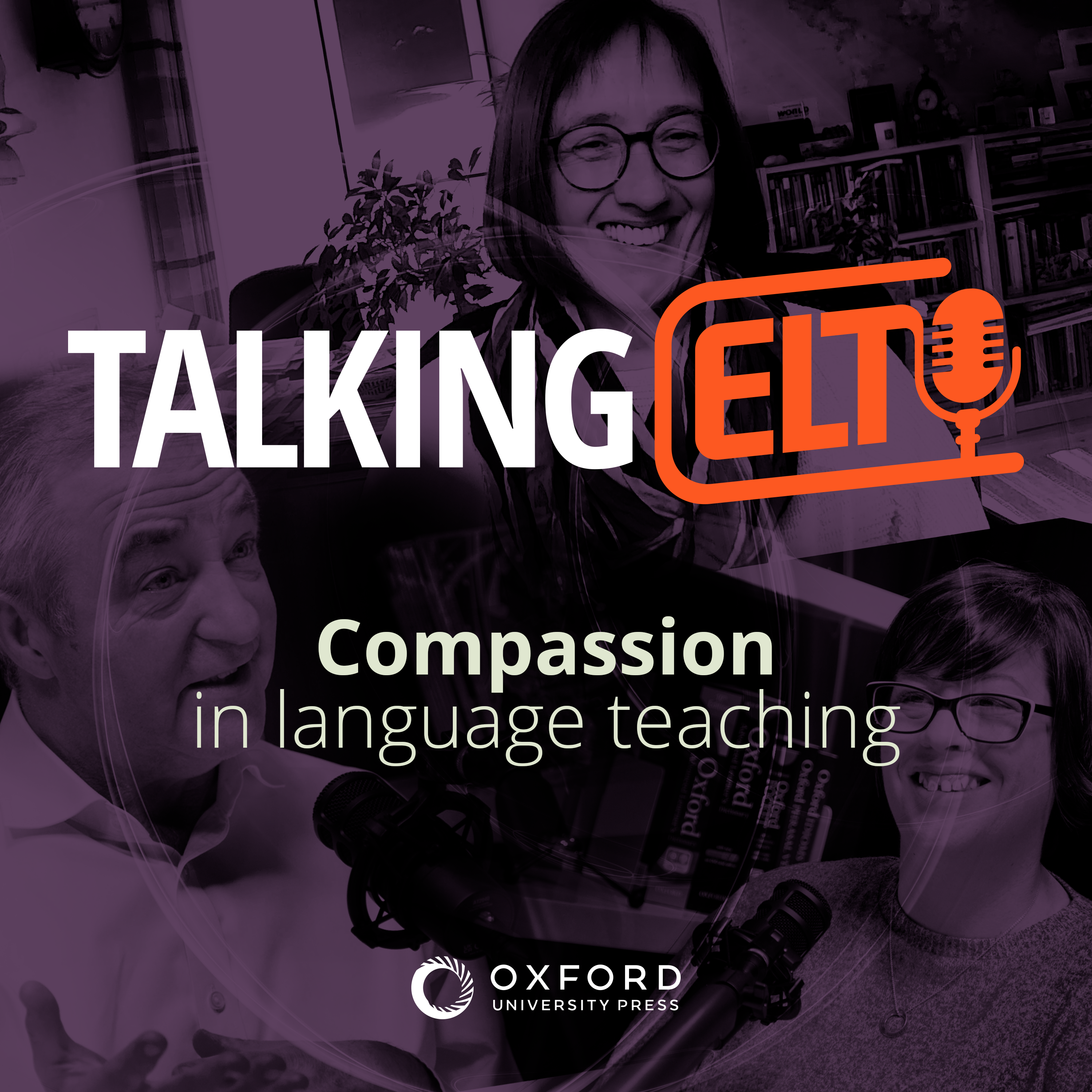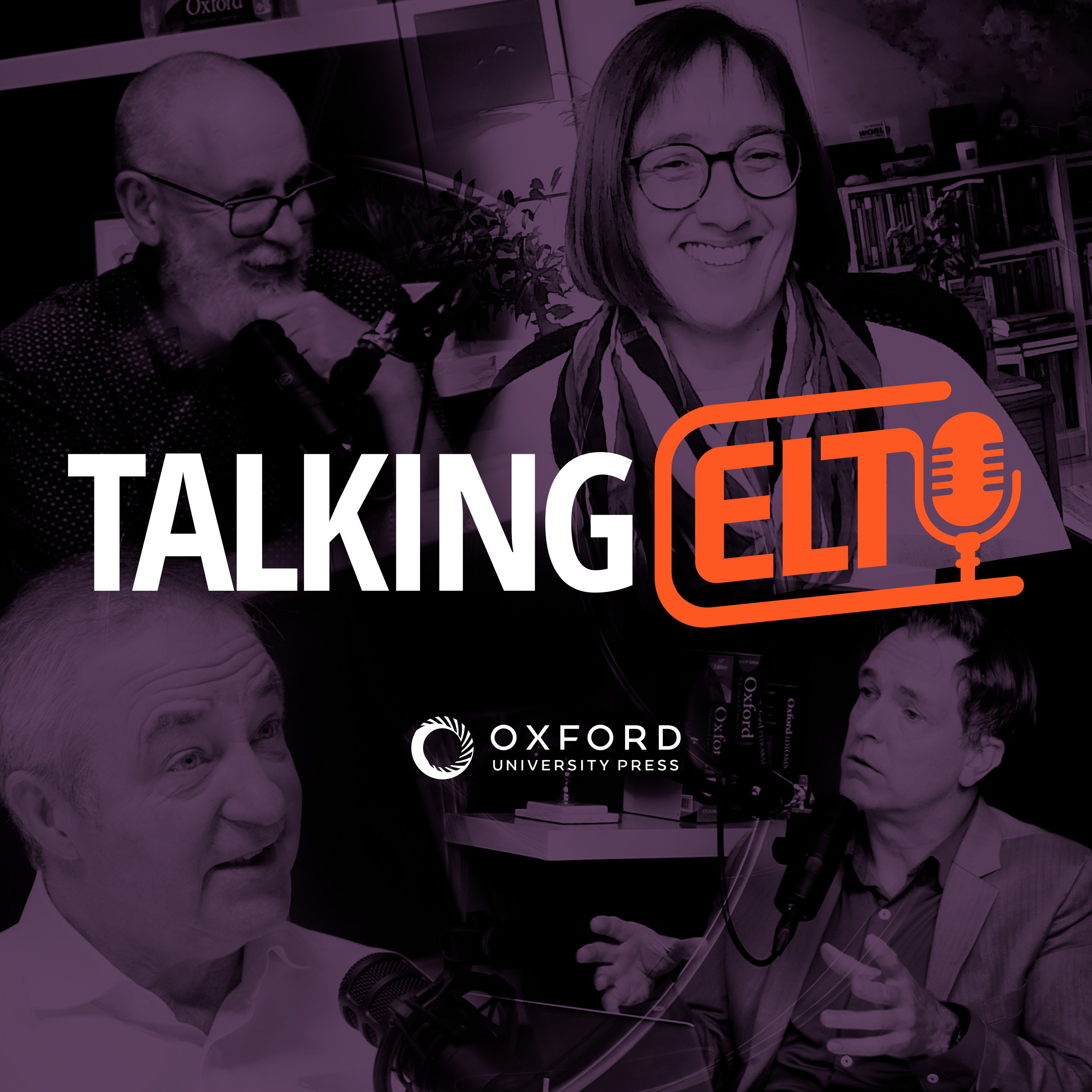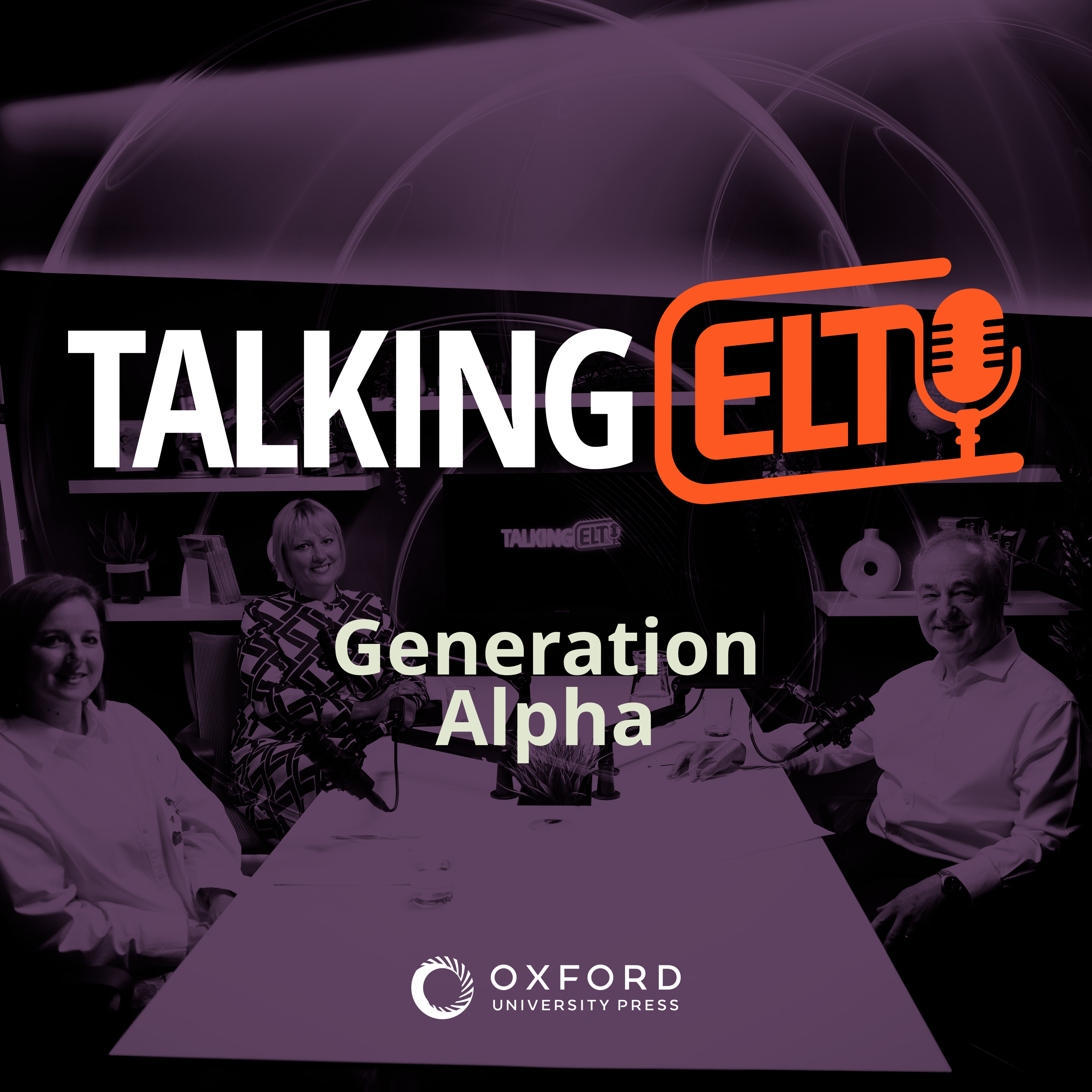Episode Transcript
[00:00:10] Speaker A: Hey, everyone, and welcome to talking ELT, the easiest place to learn about the big issues in language teaching. Today we're continuing a conversation about self regulated learning with Nathan, Hayo and Fleur. And in this last episode of the series, I'd really like to explore the roles of assessment and technology.
[00:00:29] Speaker B: We've already touched briefly on the role of assessment and the need of learners to self assess, and briefly on the role of exams and how they may impact our approach to self regulated learning.
But I kind of want to go more broadly into the relationship between self regulated learning and assessment. And I guess my first question is, how can we assess learners ability to self regulate?
[00:00:53] Speaker C: I think one of the main things that we can do as teachers when we're working with our students to bring in some kind of assessment to this, especially with regards to the framework and our area of self assessment, is to start small with having students complete a task, maybe within the classroom, within that time frame of a single session, and then having them keep a log of basically what they're doing as they go through they're completing that task. It could be something as simple as a listening task.
When you first found out that you were going to listen to this lecture, for example, what did you do? Did you do anything to prepare? What was going through your mind when the lecturer first started speaking?
How did you react? What was going on? It's this kind of idea of just really trying to break down the process of whatever the task is and getting them to think through and to be metacognitively aware. So metacognition, being, thinking about, thinking, so thinking about what was going on in your mind while you were engaging in that task or listening to that lecture, for example, starting with something small within the class, but having that documented in some kind of detail that the learner keeps track of themselves and then can share with a peer, can discuss with a peer, can submit to the teacher at the end of the class, and maybe the teacher chooses some very detailed examples to discuss in the next session, for example, this can be quite powerful and can be manageable in terms of something that takes place within the classroom, that's guided by the teacher, but that the students are leading themselves in terms of monitoring their own processes. And then in terms of assessing that, I think it's not necessarily about whether the students chose the best strategies or whether they went through every step perfectly the first time or anything like that, but it's about the depth of their reflection and it's about whether or not they're being critical of their own learning and whether or not they're aware of what they're doing. A lot of times just being able to write down very specifically what was the process like when you completed that challenging task can be very effective for making learners aware or both of what they're doing and what they're not doing, especially if they're sharing with a peer and they're becoming aware of how someone else approached a very similar task. That can be quite informative and teachers can assess, as I said previously, the depth of that reflection and whether or not they've engaged in that and also.
[00:03:21] Speaker D: Whether they've made changes as a result of their reflection. Right. Because you don't want to necessarily, as you said, punish someone for getting it wrong the first time. I'd rather have a learner who is able to reflect on what they did, recognize that there were changes that should have been, that could be made and then gets it right a second or a third time, rather than somebody who gets it right, but perhaps by chance ones the first time.
[00:03:46] Speaker E: And that's kind of a gentle way of doing it then, isn't it? Sort of pointing it out and then they don't feel so bad about it. And I also think that what you were saying is just really useful for speaking and writing in particular, because the students often struggle with those two skills. And it also helps the less confident students because they can look at the process and think, well, actually, I did quite a few things in the process. Well, even if the end result maybe wasn't so good, but the process showed good intentions, and that gives them a bit more confidence next time.
[00:04:14] Speaker C: Yeah, I think writing is a really interesting one, especially like writing a short essay, for example, because it's something concrete. It's this artifact that the learner can then look at. And as they're sort of putting together their reflection or as they're putting together their log or series of actions that they used in order to complete it.
So I think starting with something short like that within the classroom, even within a single session, and then slowly branching out to maybe two sessions or a week, or it becomes a task they complete on their own that they have to then document or what they were doing. Maybe it's linked to extensive reading or listening that they're doing outside of the normal sort of day to day kind of classroom activities. But it's starting with that single session and then branching out to something that could be a final term assignment. So not only do you submit the assignment at the end, maybe it's this big essay you've been working on. But you also submit your log, your log of how you went about completing that. So the process and the product are then balanced between.
[00:05:13] Speaker D: Yeah, and also, as you said, you start off small and then you expand, or you expect more from your students in terms of the depth of their reflection, but also the range of aspects of their learning experience that they can reflect on. And you might use the framework explicitly and ask your learners maybe towards the end of a semester or a course to reflect on whether they feel that they're better able now to identify their needs and maybe give an example of that, whether they have learned to set more practical, pragmatic, meaningful goals, whether they're able to monitor their progress and what new strategies that they've developed, for example. So you can actually, over time, make learners actively aware of the different aspects of self regulated learning because in the long term, that's what you want them to be able to do independently without any of your support. Right. Yeah.
[00:06:13] Speaker C: And in doing that, in making it a dialogue, making it an interaction with students, emphasizing that they're not being graded, assessed, or judged on necessarily the decisions that they made. But it's that, again, the depth of reflection, and it's being aware of the process and making even perhaps some critical comments about their own learning, saying that maybe there are certain aspects of this assignment or this task that I didn't do very well, but here's what I think about it now, in hindsight, or this is what I would do next time.
[00:06:47] Speaker E: And that's so powerful, isn't it?
[00:06:48] Speaker D: Yeah.
[00:06:50] Speaker C: I think that kind of gives maybe struggling learners an opportunity to kind of bridge that gap because it's not just about the final product. Maybe if they were only assessed on the essay, for example, if that's the task, maybe they would have gotten a slightly lower grade. But then they reflected very critically on the process they went through in writing that essay, for example, and that kind of maybe brings them up a notch. I don't know. This is where we get into rubrics and assessment and other things like that, but I think it's, again, that equal focus on process and product or closely related.
[00:07:24] Speaker B: Absolutely.
I suppose a follow up question I have then is we've talked a bit about assessing learners, but I kind of want to flip this a bit and ask if a school implements a self regulated learning program and teachers and the institution are trying to improve self regulation, how can we assess the value and the impact of that program both on learners and the institution as a whole?
[00:07:50] Speaker D: Yeah, that's a great question. It's the value added, isn't it? And in a way, it is a value question, meaning as an organization, as a community, you have to ask yourself, you have to clarify, what do we value?
[00:08:06] Speaker B: Okay.
[00:08:06] Speaker D: Right. So if you value, for example, that your learners are able to work well in teams, that they're able to collaborate well or able to communicate well, well, then if you find that your learners are able to do that better at the end of a year or a semester or whatever, then you have achieved that particular goal. And this is where we go back to the earlier conversation around the mismatch that we sometimes see because schools, individual teachers, might be working very, very hard to help learners develop critical thinking skills and the ability to self regulate their learning. And then unfortunately, they're assessed using one end of year exam that doesn't ask about that. But I think if you stay true to yourself, whether it's as an individual teacher or as a group of teachers or a community school, then there are many ways in which you can, of course, identify whether what you value has been achieved. For example, through the tools that Nathan just mentioned. Right.
And you're able to recognize both learners'progress as well as teachers'contributions to that progress.
[00:09:09] Speaker B: So to continue our conversation around this, we're living in a world where technology is always changing and it's having a big impact on our lives. What is the role of technology in all of this? How does technology impact self regulated learning?
[00:09:22] Speaker D: Yeah, that's an interesting question. Another one of your very broad questions, Chris. So thanks for that one. I like making you think this isn't.
[00:09:30] Speaker B: Meant to be easy.
[00:09:31] Speaker D: No, it clearly isn't. But I think, broadly speaking, you can actually use the framework and the top and the bottom half and answer that question separately for each. So if we look at the pedagogical aspect, there's obviously a lot of things, a lot of tools that are available to both teachers and learners that can help, for example, help you keep track of what you're learning, where you are in the process logs and online journals, et cetera, or even portfolios that help learners and, of course, teachers to get a sense of what a learner has been doing and as well as their reflections on that learning, et cetera. And so there's a lot of resources that will help with each of the different aspects of the framework. Okay, I'm just looking at it now here on the screen. Take, for example, setting goals. Well, there are hundreds of useful applications that help you to prioritize goals and keep track of them, et cetera. And as a teacher, if you can integrate that into your classes in some way, that could be a very helpful resource for learners to be able to continue to use into the future.
At the institutional level, the top half, I think the benefits of technology lie, I think, significantly in the area of monitoring whether learners are engaging in self regulated learning behaviors. So learning management systems as well as learning analytics can give organizations, teachers and administrators quite detailed insight into the kinds of learning practices that learners do, for example, in online environments. And an example of that would be school X has a learning management system. The teachers post homework or online assignments, et cetera, and the school is able to extract information from that learning management system to indicate, to show how much time learners are spending on the different online tasks that they have, whether they use the online journal tool or not, whether they, for example, submit revisions of their essays or whether they just submit one version. Of course, if a learner submits multiple revisions, it means that they've obviously done some sort of reflection and that they've engaged in some sort of self regulated learning. So there are a lot of opportunities there for organizations to use technology at both the pedagogical as well as the administrative side of the process.
[00:12:05] Speaker C: And I think that's especially beneficial with the idea of learners engaging in out of class learning, for example, because it's not necessarily something in the learning management system where everyone has to go and access, but maybe a pool of resources for a self access sort of online center that learners may have, and even coming down to numbers about how many resources are being accessed and what resources are accessed instead of others. And it could be a situation where the organization or the group of teachers believes that there's a resource that's being underused and maybe brings that into the classroom and says, hey, I just want to bring this to your attention. I see not a lot of people are accessing this resource. So let me tell you, let me take five minutes to tell you about it, and then maybe you might want to use this for your own self study.
[00:12:55] Speaker E: Often the case with something like online practice activities. Of course, students don't always see the importance of doing those. And yeah, so then a teacher could highlight it and say, well, I see not many people have been using them.
[00:13:08] Speaker B: It's a good point that even some of the simplest technologies like online practice, which has been around for years.
[00:13:16] Speaker D: Play.
[00:13:17] Speaker B: An important role in this framework, in this cycle.
[00:13:21] Speaker E: And teachers can get an idea at a class level of what percentage of people are doing what, and also down to an individual level, which gives them a lot more information to work on and helps personalize the learning for each student.
[00:13:34] Speaker B: Thank you all for joining me today to discuss self regulated learning. It's been really great having you here, and I've learned a lot. I hope everyone listening has, too. I guess I have one final question, which is if you had one takeaway for teachers who are looking to help their students self regulate, who are looking to get involved more with this process, what would you say? What's your final takeaway for them?
[00:14:02] Speaker E: I would say, don't put it off and think, oh, I'll do it next week, I'll do it next month. I'd say start tomorrow and do something small and keep building on that.
[00:14:10] Speaker B: Excellent.
[00:14:11] Speaker D: Yeah.
[00:14:12] Speaker C: For me, I think, first of all, congratulations for making it this far because you're listening to a podcast about self regulated learning.
[00:14:18] Speaker B: You're clearly a self regulated learner yourself.
[00:14:21] Speaker C: So I would say very similarly, you've made the investment and at least the time investment to listen to what we've had to say in this podcast and the different topics that we've spoken on. Don't be afraid to then engage the position paper to attend online seminars and workshops and basically just get involved with learning more about what others are doing and what the recommendations are within the paper. So keep taking those steps.
[00:14:48] Speaker D: Yeah, I would say two things. One, self directed, self regulated teachers make self regulated learners. And so investing in your learners involves also investing in yourself. And that is, I think, an investment that you will benefit from throughout your lifelong teaching and your life wide teaching. The second is that, and I genuinely believe this, that whatever you do with what you heard today or what you may have read in the paper is beneficial. It will have an impact on your learners and quite possibly on your colleagues and your community.
Because what all of this does is it takes you away from the everyday experiences, the everyday activities that we engage in. And it shows to yourself, to your learners, to everyone around you. We care about the future. We care about our learners future lives. We value this. And so, again, whatever you end up doing in this area will have some impact, possibly an impact that you cannot immediately recognize because it may be something that manifests itself in the future, but know that this will significantly impact your learners'lives.
[00:16:25] Speaker A: Thanks for listening to this episode of talking ELT. That brings us to the end of our series on self regulated learning. And I just want to say a big thank you to Nathan Haio and Fleur for joining us. We'll be back in a few weeks with another series on the topic of multimodality if you want to hear about that or about other important issues, make sure to like and subscribe.
While you're waiting. You can download our position paper on selfregulated learning for even more practical advice and resources to empower your teaching. You can also access loads of professional development resources on our website. You'll find links to everything in the description.


